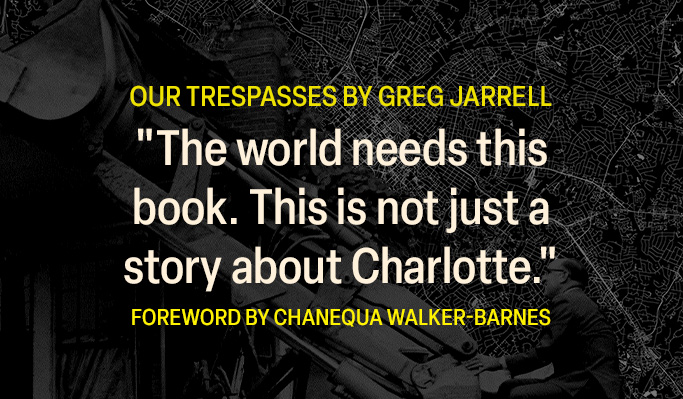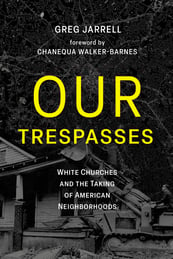
"The great failure of White Christianity is that it has never reckoned with how it was co-opted by White supremacy and Western imperialism."
This is not just a North Carolina story, even though it was in eastern North Carolina where I remember meeting Greg Jarrell for the first time in 2019. We were at another important site of the state’s racial history, the Franklinton Center at Bricks, a former “breaking plantation” where incalcitrant enslaved people were sent to be tortured into submission, later reclaimed by African Americans as a school and now operating as a retreat center and social justice incubator. We were there for the writing retreat that I facilitated together with our mutual friend, Jonathan Wilson-Hartgrove. It was there that Greg shared the story that he had uncovered in Charlotte, how he was tracing the destruction of a Black community through the story of a Black family, the Norths, and the White church, First Baptist Charlotte, that now occupies their historic home.
Reader, it turns out that this is a false memory. Greg has reminded me that we met the next year, via Zoom, when the pandemic forced us to move the retreat online. I know that this is correct now, but there is part of me that refuses to accept it. Maybe it’s because I have been waiting with bated breath for this book’s publication, often mentioning this work to my students as an exemplar of church-based racial justice work. But my memory still insists that Greg and I were walking around the Franklinton Center, the former site of racial terror that has been reclaimed and redeemed by the descendants of enslaved people, when I told him, “The world needs this book. This is not just a story about Charlotte.”
The story of the displacement of Black communities is not unique, not even within North Carolina. The same urban renewal that destroyed Charlotte’s Brooklyn community also gutted Hayti, the Durham community once monikered “Black Wall Street,” because, as one lifelong Black Durhamite once told me, “Duke [University] wanted a highway.” Throughout the United States, White institutional, political, and economic desires have often been met via the destruction of communities built by decades of Black labor and love: Charlottesville’s Vinegar Hall, Detroit’s Paradise Valley, Minneapolis’s Rondo, Tulsa’s Greenwood, San Francisco’s Western Addition, and so on.1 The problem is so pervasive that the University of Richmond has developed a digital mapping site to track the impact of these displacements.2 So this is not just a North Carolina story. It is not even a unique story. But Greg’s telling of the story is.
Greg is a careful researcher who puts names and vivid detail to the abstraction we think of as “urban renewal.” This is impeccable historical research, the type of church history that needs to be taught in seminaries and congregations. Greg shows us that the work of church historians should not be limited to the timeline between the patristic era and the Reformation. These more proximate historical moments shape the life and theology of the church as much as the ancient councils did.
But what really stands out about Our Trespasses is the way that Greg weaves his research together via compassionate storytelling and theological insight. First, he manages to avoid the tragic, and unfortunately all-too common, error that White Christians make when writing about racial issues: centering the stories of White people at the expense of Black people. He does not erase the North family or use them as a convenient object lesson to demonstrate the folly of White political, business, and religious leaders. Instead, he tells the North family story across generations, showing us how racism continues to impact descendants of American chattel slavery, Jim Crow, and urban renewal. And in doing so, he points to the deeper, more complex work that is required for White Christians to truly be antiracist.
The great failure of White Christianity is that it has never reckoned with how it was co-opted by White supremacy and Western imperialism. From Pope Nicholas V’s issuance of the Doctrine of Discovery in the fifteenth century, European and US Christians have used religion to justify racial and religious terror, including land theft, genocide, slavery, and apartheid. Greg’s narrative of Charlotte’s urban renewal project demonstrates that conquest remains the sensibility shaping the White Christian imagination. His careful documentation of the church membership and involvement of the figures in Charlotte’s Redevelopment Commission shows us that urban renewal—and its modern counterpart, gentrification—is not just a political and economic phenomenon; it is fundamentally a theological one. Civic and religious leaders in Charlotte utilized the Exodus narrative to justify conquest as God’s action, obliterating the traces of the human hands that orchestrated it. Racism so thoroughly shaped how they saw the world that even their perception of God’s answers to their prayers was filtered through it. They could not see the beauty and vitality of the families, businesses, and churches that made up the Brooklyn community. They did not care about the economic impact of the loss of homes and businesses, or the emotional impact of the loss of social ties. Their architectural imagination was thoroughly racialized.
It is especially striking that these were not rabid segregationists or even a group of highly conservative congregations. It was an ecumenical effort spearheaded by White Christians who would identify as moderate or even liberal. Ironically, it was their supposed commitment to being a downtown church, and not being sequestered in the suburbs, that led First Baptist to take advantage of the displacement of the Black Brooklyn community. Perhaps it was the fact that even in the 1960s, they had already mastered the new, colorblind racism, talking about racial issues without overtly mentioning race.3 Or maybe it was that, as my seminary professor and the former president of the Methodist Church of Southern Africa Peter Storey said about White churches in apartheid South Africa, they had learned to let institutions do their sinning for them. They did not have to think about the pain that they were complicit in.
Greg offers an invitation to remember, not just the idea of an abstract Black neighborhood that once existed, but the specific lives of Black families who continue to struggle economically because of the cascading impact of urban renewal. It is an invitation for White Christians, in and beyond Charlotte, to transcend the fear of confronting their pasts, to move beyond silence, and to remember.
White Christians like to speak of reconciliation when it comes to racism, but there can be no reconciliation without truth-telling, even when it is hard, especially when it is hard. Reconciliation is an eschatological journey, but it begins here and now, with one step toward repair. And then another, and another. There are no easy solutions here, and I’m grateful that Greg doesn’t pretend to offer any. What he does offer is an example of how to remember.
And somewhere in the memory, there is hope. It is tempting to look at the sin of urban renewal and to throw our hands up in despair, thinking that the sin is too big and the wound too deep to repair. But the story of the Brooklyn community shows us the power of Whiteness to literally move an entire neighborhood. If that can be done in the name of injustice, surely it could be done in the name of justice. As Greg states,
The theological architecture of decades past still stands today. Repairing what can be repaired, and demolishing the rest, presents the greatest and the most daunting work for white churches who wish to enact justice, which is to say, to disavow their whiteness in the pursuit of repair. Only by breaking the silence to tell stories on ourselves, and by identifying the persistent theologies that prop up those stories, can white churches conjure differently and live into a future healed from the hauntings in which we live.
White churches, you do not have to choose the silence. This is your clarion call. It is time to put up or shut up, to move beyond the pretense of racial innocence and feigned helplessness. How will you respond?
Chanequa Walker-Barnes, PhD
This is an excerpt from Our Trespasses: White Churches and the Taking of American Neighborhoods by Greg Jarrell and foreword by Chanequa Walker-Barnes.



